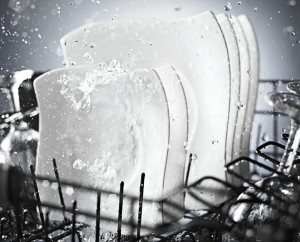A Tale of Two Dishwashers
By Gwen Rockwood, newspaper columnist and mama of 3
I’ve heard horror stories about how some spouses constantly butt heads with their in-laws. And I’m lucky because I don’t have those war stories. I love my husband’s family and he loves mine, and we’re blessed to get along the way we do.
But there’s one tiny bone of contention between my husband and my mother, and I land squarely in the middle of the debate. Perhaps you can be the judge. The question revolves around the proper loading of a dishwasher, and the issue comes up after we have Sunday lunch together and start the clean-up process.
In this corner is my mother, who has never once loaded a truly dirty dish into any dishwasher – hers or mine. She washes and rinses the dishes first and then puts them into the dishwasher for what she calls “sterilization.” In her mind, the dishwasher is an  extra safety check to ensure the dishes have received “a good scald” and are therefore germ-free.
extra safety check to ensure the dishes have received “a good scald” and are therefore germ-free.
But rest assured you could safely eat from any plate she puts into the dishwasher well before she runs the wash cycle because it has already been scrubbed, rinsed and examined with a careful eye. She treats forks and spoons like a surgeon treats scalpels and retractors.
In the other corner is my husband, who has never once loaded anything resembling a clean dish into any dishwasher. He, like many men, takes the name “dishwasher” literally. If the machine is supposed to wash the dishes, then by all means, “let’s let it wash the dishes!” he insists. After all, there are other things to do and Sunday afternoon naps to be taken. Why waste time scrubbing lasagna remnants off of plates when we’ve invested in this expensive piece of machinery that’s supposed to do it for us?
But the debate doesn’t end there. When my mom loads the dishwasher, she’s careful to leave plenty of perimeter space around each and every dish and utensil. She worries that if the plates and bowls don’t have enough breathing room, they’ll be blocked off from all that hot, sanitizing water.
Tom, on the other hand, has a theory about how many dirty dishes will fit into the dishwasher. It goes something like this: “The number of dirty dishes in the kitchen is the same number that will safely fit into the dishwasher at any one time.” In his mind, the dirty dishes of two people or 20 people can and will fit into the dishwasher, if you just put your mind to it and pack them in there efficiently.
Remember that old commercial about how there’s “always room for Jell-O”? Tom applies that same logic to cups and plates, too. I must admit he is a master when it comes to finding that one last nook or cranny of available space.
A few weeks ago, as Tom squeezed yet another cup into what my mother deemed an overly full dishwasher, she actually put down her scrub brush, shook her head and said, “I just can’t watch this.” She had to avert her eyes from the horror of all those cups packed into the top rack like so many dirty sardines.
My philosophy is simple. Don’t criticize the cleaning method of anyone – mother or husband – who helps with the dishes because that criticism might dampen their willingness to help in the future.
But I can tell you this: When I unload the dishwasher, I can always tell which one of those two people loaded it, and I’m reminded of the opening line to that famous Dickens novel: “It was the best of times, it was the worst of times.”
 Gwen Rockwood is a mom to three great kids, wife to one cool guy, a newspaper columnist and co-owner of nwaMotherlode.com. To read previously published installments of The Rockwood Files, click here. To check out Gwen’s new book, “Reporting Live from the Laundry Pile: The Rockwood Files Collection,” click HERE.
Gwen Rockwood is a mom to three great kids, wife to one cool guy, a newspaper columnist and co-owner of nwaMotherlode.com. To read previously published installments of The Rockwood Files, click here. To check out Gwen’s new book, “Reporting Live from the Laundry Pile: The Rockwood Files Collection,” click HERE.
Photo credit: Lisa Mac Photography
